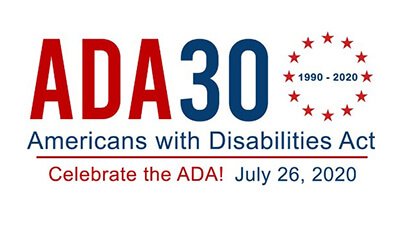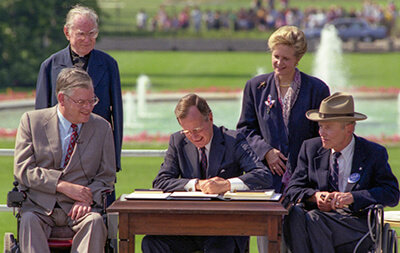#ADAat30: What is the Americans with Disabilities Act?
In honor of the 30th anniversary of the Americans with Disabilities Act (ADA), our #ADAat30 blog series breaks down the basics of this historic civil rights law: its purpose, who it protects and what it covers.
 Signed on July 26, 1990, the ADA is the world's first comprehensive civil rights law for people with disabilities. It gives similar protections to those provided to individuals based on race, color, sex, national origin, age and religion, as it guarantees equal opportunity for individuals with disabilities and prohibits discrimination against them in all areas of public life, including work, schools, transportation and public and private places that are open to the public.
Signed on July 26, 1990, the ADA is the world's first comprehensive civil rights law for people with disabilities. It gives similar protections to those provided to individuals based on race, color, sex, national origin, age and religion, as it guarantees equal opportunity for individuals with disabilities and prohibits discrimination against them in all areas of public life, including work, schools, transportation and public and private places that are open to the public.
Social Security's Ticket to Work (Ticket) Program supports career development for people ages 18 through 64 who receive Social Security disability benefits (SSI or SSDI) and want to work. Let's examine how Title I of the ADA protects people with disabilities in the area of employment.
People with disabilities can be vulnerable to discrimination in the workplace — both when applying for jobs and once they have a job. We hope this will never happen to you. However, it is important to know what actually constitutes discrimination, and what your rights and responsibilities are if you believe you have experienced discrimination because of your disability.
This section gives people with disabilities the same employment opportunities and benefits that are available to people without disabilities. The U.S. Equal Employment Opportunity Commission (EEOC) regulates and enforces this portion of the law, which applies to private employers with 15 or more employees, State and local governments, employment agencies, and labor unions.
The ADA requires reasonable accommodations —modifications or adjustments — to (1) ensure equal opportunity in the application process; (2) enable a qualified individual with a disability to perform the essential functions of a job; and (3) make it possible for an employee with a disability to enjoy equal benefits and privileges of employment. For more information and examples of reasonable accommodations, including technical assistance, contact the Job Accommodation Network for free, expert and confidential guidance. Depending on the situation, your employer may even consider working from home a reasonable accommodation request.
Beyond the protections afforded in areas of employment, the ADA is divided into 4 additional sections (or titles) that relate to different areas of public life.
- Title II: Programs, activities and services of state and local governments, including the requirement that they be accessible to people with disabilities; for example, by removing physical barriers, permitting service animals in public places, using sign language interpreters at public meetings and events, and making websites compatible with screen readers and similar accessibility tools.
- Title III: Public accommodations, such as small businesses and retail merchants, hotels, restaurants, doctor's offices, golf courses and health clubs, private schools, day care centers, stadiums and arenas, theaters, and the like must comply with ADA accessibility standards.
- Title IV: Telecommunications, which requires telephone and Internet companies to provide systems that allow individuals with hearing or speech impairments to communicate by way of a Text Telephone or other non-voice device.
- Title V: Various miscellaneous provisions, including that the ADA prohibits any retaliation, intimidation, coercion, threats and any other form of interference with people who seek to exercise their rights under the ADA. These provisions also protect people without disabilities who, for example, advocate or testify on behalf of individuals with disabilities.
About Ticket to Work
 There's a lot to consider when job searching and it can be tough trying to do everything on your own. The Ticket Program can connect you with people who can help you request reasonable accommodations or other support that may help you in the workplace. The Ticket Program is free and voluntary. It helps people with disabilities move toward financial independence and connects them with the services and support they need to succeed in the workforce.
There's a lot to consider when job searching and it can be tough trying to do everything on your own. The Ticket Program can connect you with people who can help you request reasonable accommodations or other support that may help you in the workplace. The Ticket Program is free and voluntary. It helps people with disabilities move toward financial independence and connects them with the services and support they need to succeed in the workforce.
By participating in the Ticket Program, you'll have access to a wide variety of services from Ticket Program service providers that offer free short-term and long-term supports to help you find and maintain employment.
Learn more
To learn more about the Ticket Program, call the Ticket to Work Help Line at 1-866-968-7842 or 1-866-833-2967 (TTY) Monday through Friday, 8 a.m. to 8 p.m. ET. Ask a representative to send you a list of service providers or find providers on your own with the Ticket Program Find Help tool.